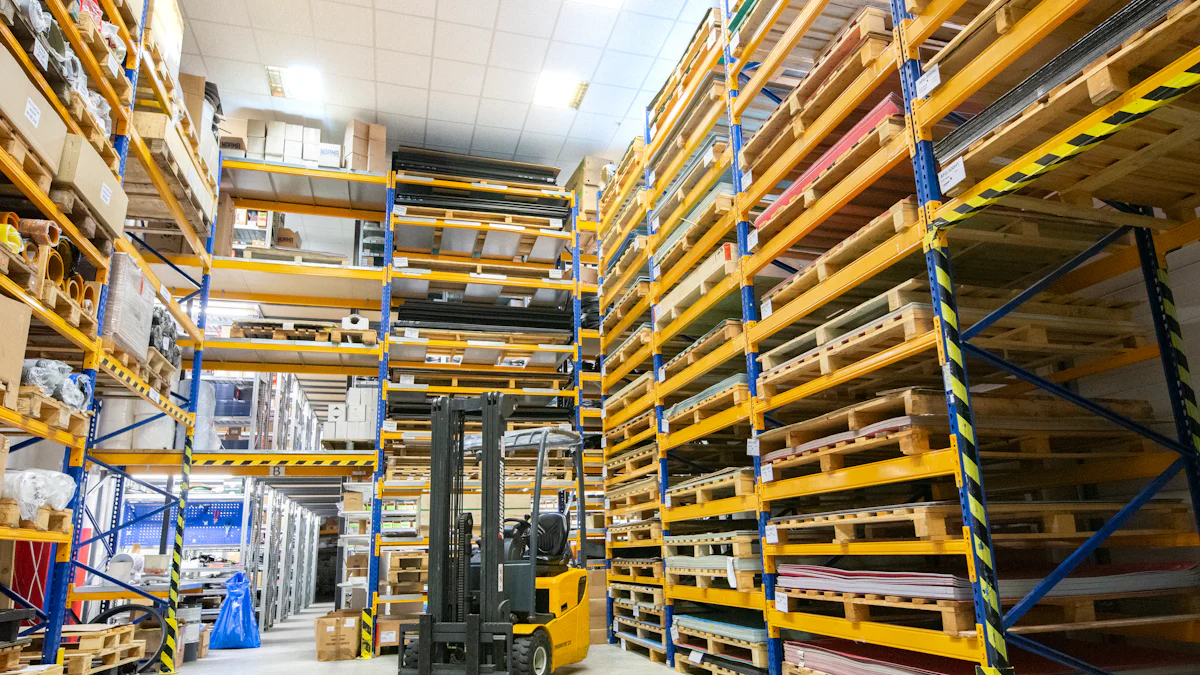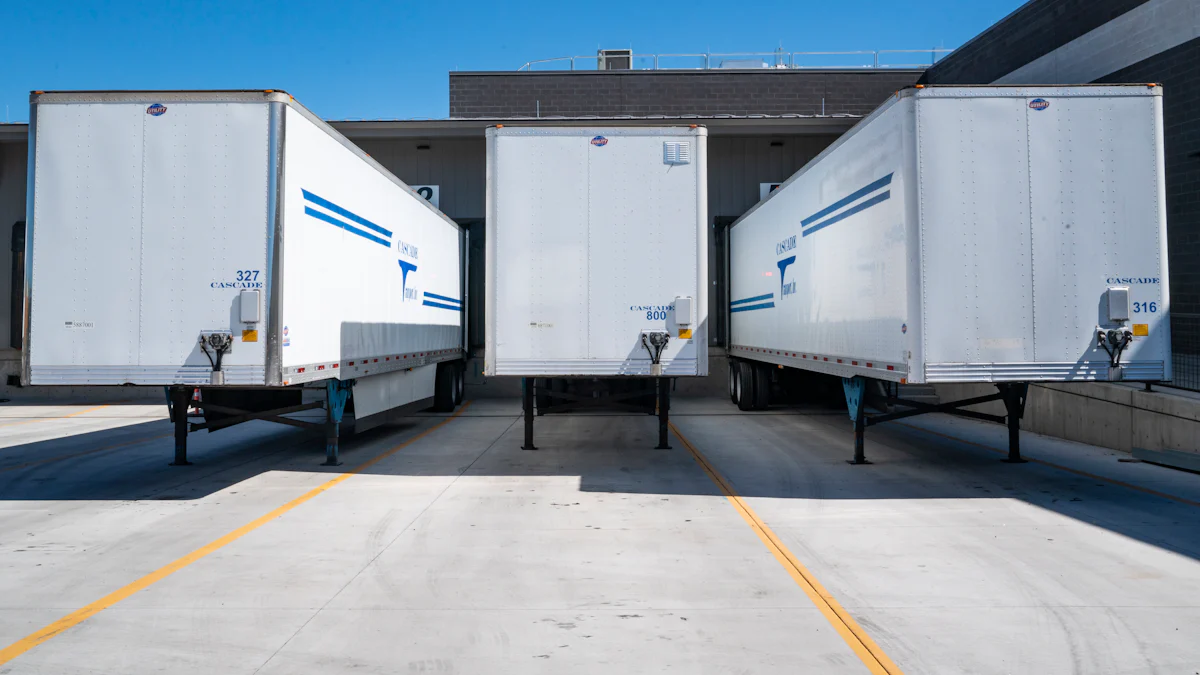Logistics Savings Unleashed: Insider Secrets for Supply Chain Efficiency

In the realm of supply chain management, logistics savings stand as a pivotal factor driving operational efficiency and cost-effectiveness. By delving into top-notch strategies backed by data-driven insights, organizations can unlock substantial reductions in transportation costs. The landscape reveals a significant 15% decrease in logistics costs for early adopters of AI, emphasizing the economic value awaiting those who embrace innovation. With logistics spending on the rise, efficient cost management becomes paramount to harnessing hidden savings and optimizing overall performance.
Leveraging AI for Logistics Savings

In the realm of supply chain management, logistics savings are paramount to driving operational efficiency and cost-effectiveness. When it comes to leveraging artificial intelligence (AI) for logistics savings, companies can unlock a treasure trove of benefits through data-driven insights and innovative strategies.
Analyzing Data for Efficiency
To kickstart the journey towards enhanced efficiency, organizations must focus on internal data utilization. By harnessing the power of AI to analyze internal data streams, businesses can uncover hidden patterns and trends that lead to streamlined operations and optimized resource allocation.
When it comes to external data integration, seamless connectivity with external sources is key. By integrating diverse datasets from suppliers, partners, and market trends into their AI systems, companies can gain a comprehensive view of the logistical landscape. This holistic approach enables proactive decision-making and real-time adjustments to meet evolving demands.
Predictive Analytics
The next frontier in logistics savings lies in demand forecasting. Through advanced predictive analytics powered by AI algorithms, organizations can anticipate market fluctuations and consumer behavior with precision. By accurately predicting demand patterns, businesses can optimize inventory levels, minimize stockouts, and reduce carrying costs.
In parallel, effective inventory management is crucial for maintaining lean operations. AI-driven inventory optimization tools enable real-time visibility into stock levels, leading to reduced holding costs and improved order fulfillment rates. By automating replenishment processes based on predictive analytics, companies can achieve optimal inventory turnover ratios and enhance overall operational efficiency.
Automation in Logistics
Embracing automation is a game-changer for unlocking substantial logistics savings. Through process automation, routine tasks such as order processing, invoicing, and shipment tracking can be streamlined for maximum efficiency. By eliminating manual interventions and reducing error rates, businesses can achieve significant cost reductions while enhancing customer satisfaction levels.
Furthermore, the integration of robotics in warehousing revolutionizes traditional logistics operations. Automated guided vehicles (AGVs) and robotic arms optimize warehouse layouts, accelerate order picking processes, and ensure precise inventory management. By deploying robotics solutions strategically across warehouses, organizations can minimize labor costs, maximize storage capacity utilization, and boost overall productivity.
By embracing AI-powered solutions across various facets of logistics operations—from data analysis to predictive modeling to process automation—businesses can unlock unprecedented opportunities for driving down costs while enhancing supply chain efficiency.
Proactive Cold Chain Solutions

Reducing Air Transport Dependence
In the realm of supply chain logistics, reducing dependence on air transport can yield significant benefits for businesses. While air transport offers unparalleled speed and efficiency, it comes at a higher cost compared to other modes of transportation like sea or land transport. The key lies in striking a balance between cost-effectiveness and operational efficiency.
Cost Benefits
Air transport is generally more expensive due to factors like fuel costs, infrastructure investments, and handling fees compared to sea or land transport. However, businesses can justify the cost of air freight for time-sensitive or high-value goods due to its increased efficiency and reduced risk of damage or loss.
For example, while a $195 ocean shipment may suffice for certain cargo, an air shipment of the same goods could cost around $1,000. This stark difference underscores the need for strategic decision-making when selecting transportation modes based on cost considerations.
Environmental Impact
Beyond cost considerations, reducing air transport dependence also has positive environmental implications. Air freight contributes significantly to carbon emissions due to its reliance on jet fuel and energy-intensive operations. By shifting towards more sustainable modes of transportation like sea or road options where feasible, businesses can mitigate their carbon footprint and contribute to environmental conservation efforts.
Embracing eco-friendly practices not only aligns with corporate social responsibility goals but also resonates with environmentally conscious consumers. Sustainable supply chain management practices are becoming increasingly important in today's business landscape as stakeholders place greater emphasis on ethical and green initiatives.
By strategically evaluating the trade-offs between air transport efficiency and cost considerations, businesses can optimize their logistics operations for both economic savings and environmental sustainability. Embracing proactive cold chain solutions that prioritize sustainability while maintaining operational effectiveness is key to driving long-term value creation in the evolving logistics landscape.
Implementing a Transportation Management System
Cost Reduction
Freight Cost Management
Implementing a Transportation Management System (TMS) can revolutionize how businesses manage their freight costs. By leveraging advanced technology and data-driven insights, companies can optimize their transportation operations for maximum cost efficiency. One of the key benefits of a TMS is its ability to streamline freight cost management through various features:
Simulation and network design capabilities enable businesses to model different scenarios and identify the most cost-effective routes for transporting goods.
Load consolidation functionalities help in combining multiple shipments into a single load, reducing overall transportation expenses.
Lower cost mode selections allow companies to choose the most economical transport modes based on factors like distance, urgency, and cost constraints.
Route Optimization
Efficient route optimization is another critical aspect where a TMS excels. By analyzing various parameters such as traffic conditions, delivery schedules, and vehicle capacities, businesses can optimize their routes to minimize fuel consumption and reduce overall transportation costs. Some benefits of route optimization include:
Minimized fuel consumption leads to lower operational costs and reduced environmental impact.
Enhanced delivery schedules ensure timely arrivals, improving customer satisfaction levels.
Optimal route planning reduces unnecessary mileage and idle time, resulting in significant savings for businesses.
Emission Reduction
Sustainable Practices
In today's environmentally conscious landscape, adopting sustainable practices is not just a choice but a necessity for businesses looking to reduce their carbon footprint. A TMS plays a crucial role in promoting sustainability within transportation operations by:
Encouraging the use of eco-friendly transport modes such as electric vehicles or hybrid trucks.
Implementing green initiatives like paperless documentation and digital invoicing to minimize waste generation.
Monitoring emissions data and providing insights for reducing greenhouse gas emissions across supply chain activities.
Green Logistics
Green logistics has emerged as a strategic approach towards achieving environmental sustainability in transportation management. By integrating eco-friendly practices into logistics operations, businesses can achieve dual benefits of cost savings and reduced environmental impact. Key aspects of green logistics include:
Opting for renewable energy sources to power transportation fleets and distribution centers.
Implementing recycling programs for packaging materials to promote circular economy principles.
Collaborating with environmentally responsible partners to create a sustainable supply chain ecosystem.
By embracing a Transportation Management System that prioritizes both cost reduction and emission mitigation strategies, businesses can pave the way towards a more efficient, sustainable, and future-ready logistics framework.
RetailShip utilized predictive analytics to accurately forecast demand, optimizing inventory management and achieving cost savings. E-Commerce Express leveraged data insights to streamline reverse logistics, reducing return rates by 20% and saving on return shipping expenses. Early AI adoption in the supply chain sector led to a 15% decrease in logistics costs, as reported by McKinsey research. By partnering with freight audit advisors, shipping companies identify various cost-saving opportunities within their logistics operations. Embracing innovative technologies and data-driven strategies is imperative for organizations seeking to drive down costs and enhance operational efficiency in the dynamic landscape of supply chain management.
See Also
Transforming Supply Chain: Innovating Logistics for Impact
Enhancing Efficiency: JUSDA's Logistics Optimization
Discover Efficiency: Assessing Your Supply Chain
Future of Logistics Tech: Breakthroughs Unveiled
High-Tech Manufacturing: Solutions for Streamlined Supply Chain
